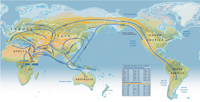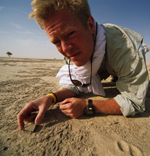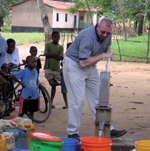|
Researcher
Spencer Wells, Ph.D., travels the
farthest reaches of the globe
using DNA samples as a tool to
unravel secrets of the human
story, tackling such issues as the
origin of humans and how they
spread across the globe. His
travels will include a stop at
MUSC at 4 p.m. Sept. 14 when he'll
present his talk on "Discover the
Roots of the Human Family Tree" on
the 8th floor of the Storm Eye
Institute Auditorium.
 A Chadean woman
makes her way home as the sun
sets over the Sahara Desert. A Chadean woman
makes her way home as the sun
sets over the Sahara Desert.
He is one in an
impressive line-up of speakers
Sept. 12 - 16 for the first Global
Health Seminar Series, Why Global
Health Matters, according to Lisa
Saladin, Ph.D., interim dean of
the College of Health Professions.
The series
includes local faculty involved in
global work and national experts,
such as Michael H. Merson, M.D.,
director of Duke Global Health
Institute, and Kevin O'Reilly,
Ph.D., a scientist with the World
Health Organization.
Saladin said the series will
provide students and faculty an
opportunity to learn about the
importance of research and
collaboration in global health
from some of the leading experts
in the field.
National
Geographic Maps
 This is a map of
early human migration patterns,
part of the Genographic Project
aimed at tracing the migratory
history of the human species. This is a map of
early human migration patterns,
part of the Genographic Project
aimed at tracing the migratory
history of the human species.
"Each of our
speakers brings an essential
perspective and a unique approach
to globalization, offering insight
on three very different but
related themes: Where
did we come from and how did we
populate the globe? Why does
global health matter to the
U.S.? How do we address the
challenges that confront over 30
percent of the world's population
living in extreme poverty which
prevents them from accessing basic
resources?"
Saladin said
Wells is a dynamic speaker,
accomplished genetics researcher
and filmmaker who has traced
humans' origins and migratory
paths across the globe through his
work with National Geographic.
Photo by
David Evans
 Dr. Spencer Wells,
director of the Genographic
Project, finds signs of an old
encampment in the Sahara Desert. Dr. Spencer Wells,
director of the Genographic
Project, finds signs of an old
encampment in the Sahara Desert.
Merson will
bring his wealth of knowledge,
having founded the global health
institute at both Yale and Duke
universities.
"We are often
asked why we, as Americans and
South Carolinians, should care
about the health of people in
other countries, especially given
the current economic challenges,
rising health care costs and
growing national deficit. Dr.
Merson's talk will shed some light
on the issue by sharing how global
health is indeed, our health, and
how the problems abroad are
looking more and more like the
problems we face at home."
O'Reilly's talk
will be drawing from his long
history at the Centers of Disease
Control and Prevention and the
World Health Organization. "He
will address an issue that faculty
and health care professionals at
MUSC are all too familiar with:
how do we address the needs of
neglected populations on the
global stage and what are the most
pressing needs, challenges and
opportunities in global health,"
she said.
The seminar is
just one way MUSC is pushing ahead
with its global initiatives set
out in its strategic plan. Other
new global developments are:
- An
exciting start to the year for
globalization efforts,
starting with Dr. William
Plater from Indiana
University-Purdue University
who served as the keynote
speaker at the recent Faculty
Convocation addressing "Global
health and its importance to
MUSC."
- This
September, MUSC launched a
global health certificate
program which is open to our
students and faculty and will
provide an understanding of
critical health issues
worldwide and ways to address
or solve them.
- A
global health website, http://www.musc.edu/globalhealth,
will be expanded this fall,
and will be a resource tool to
connect faculty, staff and
students and provide a
platform to spark future
international collaborations
in all three areas of MUSC
mission.
- The
current work with consultants
to develop a business plan for
a proposed Center for Global
Health.
The
series also will include an
international food festival
Sept. 15. Speakers in the series
will be videotaped for those who
cannot attend.
Inaugural Global Health Speaker
Series: Why Global Health Matters
Wednesday, Sept. 14
Spencer
Wells, Ph.D., National
Geographic
Explorer-in-Residence, director
of Geongraphic Project
"Discover the Roots of the Human
Family Tree"
Storm Eye Institute Auditorium,
4 p.m.,
Reception to follow
Thursday, Sept. 15
International
food festival
Horseshoe, 11 a.m. - 1:30 p.m.
Lunchtime
Speaker Series
Noon - 1 p.m., Colbert Education
Center & Library (CECL)
 Dr. Michael Sweat
getting water in an African
village where he's done
research. Dr. Michael Sweat
getting water in an African
village where he's done
research.
Michael
Sweat, Ph.D., professor,
Psychiatry & Behavioral
Sciences, Institute of
Psychiatry. Room 109, CECL
"HIV Prevention and Care in
Less-Developed Countries"
Shane
Woolf, M.D., assistant
professor, Orthopaedic Surgery.
Room 115, CECL "MUSC Response to
Haiti's Disaster: Lessons
Learned"
Friday,
Sept. 16
Storm Eye Institute Auditorium,
HA809, Noon to 1 p.m.
Michael H. Merson, M.D.,
director, Duke Global Health
Institute
"Why Global Health Matters to
the U.S."
1 to 2 p.m.
Kevin O'Reilly, Ph.D., scientist,
World Health Organization, "Needs,
Opportunities and Challenges in
Global Health"
|



 A Chadean woman
makes her way home as the sun
sets over the Sahara Desert.
A Chadean woman
makes her way home as the sun
sets over the Sahara Desert. This is a map of
early human migration patterns,
part of the Genographic Project
aimed at tracing the migratory
history of the human species.
This is a map of
early human migration patterns,
part of the Genographic Project
aimed at tracing the migratory
history of the human species. Dr. Spencer Wells,
director of the Genographic
Project, finds signs of an old
encampment in the Sahara Desert.
Dr. Spencer Wells,
director of the Genographic
Project, finds signs of an old
encampment in the Sahara Desert. Dr. Michael Sweat
getting water in an African
village where he's done
research.
Dr. Michael Sweat
getting water in an African
village where he's done
research.